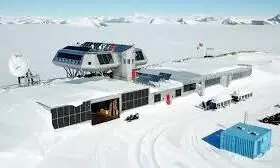
India to incorporate polar and Himalayan research in school curriculum
text_fieldsIndia's advancements in research on the Arctic, Antarctica, and the Himalayas are set to become part of school textbooks.
Ministry of Earth Sciences Secretary M Ravichandran announced that the NCERT has established a committee to highlight the significance of research in these areas within school textbooks.
"We wrote a letter to them... they (NCERT) have recently constituted a committee for bringing out importance of the Antarctica expedition, Arctic and also the Himalayas and some other aspects, including climate change. They are working on it," Ravichandran stated during an interaction with PTI editors.
While the Antarctica expedition is already featured in NCERT textbooks, the content has not been updated for an extended period. Similarly, there is limited coverage of ongoing research in the Arctic and Himalayan regions.
In response to the rationalization exercise post-COVID-19, where topics like climate change, monsoon, and greenhouse effect were removed from textbooks to reduce curriculum load, the NCERT clarified that these subjects would be restored in the new curriculum framework.
These updated textbooks are expected to be available for all classes by 2026.
Additionally, India is hosting the 46th meeting of the ATCM and the 26th CEP meeting, the highest governing bodies for Antarctica, in Kochi from May 20-30. These meetings will provide a platform for countries engaged in Antarctic research to share their scientific findings and plans.
India currently operates two active research stations, Maitri and Bharti, in Antarctica. The country's first research station, Dakshin Gangotri, established in 1983, had to be abandoned after sinking in the snow.
Regarding student involvement in polar research, Thamban Meloth, director of the National Centre for Polar and Ocean Research (NCPOR), mentioned that while high school students have not been directly involved, several senior students engaged in research have visited Antarctica.
When asked about the feasibility of introducing a program like Students on Ice for Indian school students, Meloth cited logistical challenges and costs, stating, "It costs around ₹ 1 crore to send a single person to Antarctica... there are a lot of other logistical issues too when it comes to high school students."























